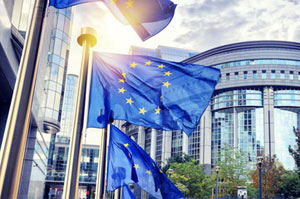



Opinion - There is much to be expected from the Slovenian Presidency when it comes to agriculture
Ramón Armengol, President of Cogeca, gives his take on the Slovenian Presidency's Programme for agriculture in the EU.With the summer holidays coming to an end and with the harvest completed almost everywhere across Europe, it is a good moment to reflect and prepare for the rest of the year. Judging from the Slovenian Presidency's programme presented at the beginning of July, we can certainly expect at least the same intensity of work that we have witnessed so far this year. In light of the upcoming informal Council, which will be held in the magnificent Slovenian countryside, I wish to share some of my more formal thoughts.

To me, there are two ways to read the Slovenian Presidency’s Programme from an agricultural perspective. The first is to look only at the (already very dense two pages of purely) agricultural measures. The second is to look at all the Green Deal-related measures and the entirety of initiatives affecting agriculture. With this wider approach, the list of policies with direct and indirect impacts on our profession seems almost endless. Those who believed that the political agreement on the CAP trilogue negotiations under the Portuguese Presidency marked a culmination of achievement, should consider it just one of the milestones on a long journey.
Looking beyond the purely agricultural package, the first elements in which agriculture will play a key role are the environmental and trade priorities set by the Slovenian Presidency. The new Presidency clearly states making progress in climate change, biodiversity and the circular economy as its priority. Much of the work has already begun with the release of the enormous “Fit for 55 package” in July and the EU Biodiversity Strategy discussion on the restoration plan that should be released at the end of this year. Europe has sent out a strong message showing its determination. In the same week, terrible floods, which affected many farms, demonstrated the need to move forward. Rural communities are ready to help with this change and I am even convinced that they will be the driving force behind it.
For us, all issues related to the climate or biodiversity can be debated within the Union on the one essential preliminary condition that we apply the same level of ambition to our trade policy. It is no secret to say that the Green Deal will accelerate the gap in production standards between our domestic market and our imports. Today, these gaps are already problematic for numerous types of production as they seriously affect the cash flow of many farms and limit transition investments. Trade agreements such as EU-Mercosur will widen that gap and further undermine our ability to invest. Key decisions are on the Presidency’s table, such as the ratification of the package. We are extremely concerned by the decision to change the ratification procedure for mixed agreements. The evolution of the EU-Mercosur agreement will be an interesting marker, proving the consistency (or inconsistency) of the Union with regard to its major objectives.

With key international trade deadlines looming over the Slovenian Presidency, it is essential for us that the voluntarism of the Green Deal is reflected in our trade approach. We will closely follow the conclusions of the 12th WTO Ministerial Conference and the UN Food System Summit as they will give a hint about the main international trends in the near future and show Europe’s potential to lead.
On bilateral agreements, besides the EU-Mercosur agreement, we expect the Slovenian Presidency to be consistent with all the agreements mentioned in its working document, namely the agreements with Mexico, Australia, New Zealand and Chile.
Another key debate under the Slovenian Presidency will be the one on the carbon border adjustment mechanism. The willingness to set up this mechanism is Europe’s initial response to the question of coherence between the single market and international trade. However, in the case of agriculture, the current proposal raises some questions. Even though we see room to include agriculture as a package, we cannot have a system where the fertiliser sector is integrated while the rest of agriculture is excluded. This sector is already overprotected at EU level. The introduction of such a mechanism would further reduce the farmers’ and cooperatives’ sources of supply, making the financial balance untenable for farmers, again hindering our capacity to invest in sustainability.
Finally, together with the Slovenian Presidency, we will pay close attention to the turbulent developments in EU-UK relations at a time when the issue of food supply in the UK still poses many challenges. We have been supportive of the EU’s approach to ensure the integrity of the single market.

Turning now to the Slovenian Presidency’s purely agricultural roadmap, I must say that it seems to me to be just as ambitious and busy. In the words of the Minister of Agriculture, Forestry and Food, Jože Podgoršek, finalising the CAP reform package and assisting the post-pandemic recovery will be the main drivers.
On the CAP front, the Slovenian Presidency has already delivered on one element as they formally agreed on the consolidated legal texts and communicated the outcome of the first reading to the European Parliament. I now hope that the formal vote in the plenary of the Parliament can take place at the end of October. For European farmers and agri-cooperatives, a swift conclusion is essential as it will allow farmers to be more prepared and to better plan ahead.
Strengthening the resilience of the European agriculture and food system is another of the Slovenians’ key priorities, especially in light of the lessons learnt from the outbreak of the COVID-19 pandemic. I have high expectations for the creation of an EU food crisis response mechanism. In terms of further sustainable development, the Presidency has also pointed out the importance of enhanced dialogue between rural and urban areas as well as the need for further investment towards more digitalisation, modernisation and support for family farming and women in the sector. European farmers and agri-cooperatives also see these all as key elements for thriving rural areas and a sector moving towards increased environmental, social and economic sustainability. The Presidency also acknowledged the need for an improved position of farmers in the food supply chain with the expected report on the transposition and implementation of the Directive on Unfair Trading Practices to be published by the end of the year. It is a report that European farmers are eagerly awaiting as this legislation is something that the sector already needed decades ago.
Another important event in the second half of the year will be the publication of the European Commission’s Communication on the contingency plan to ensure food supply and food security. This roadmap is something many stakeholders in the sector are eager to see and will undoubtedly propel the debate on the need for a strong action plan in the event of future crises to guarantee a steady supply of high-quality and nutritious food in Europe.

Plant and animal health are two dossiers that each Presidency moves forward one way or another due to their important role in food safety and security and in contributing to biodiversity and the environment. With regard to plant health, the Slovenian Presidency will have the important task of coordinating Member State and Commission positions on the fulfilment of phytosanitary requirements for plants and plant products in the negotiations on trade agreements with third countries. As for animal health and welfare, we see that the Presidency aims to continue to focus on biosafety and will pursue the work on animal welfare based on the awaited fitness check report and the inception impact assessment on the EU animal welfare legislation. We believe in market-oriented animal welfare mechanisms and in the principle of “as little as possible, as much as necessary” when treating our animals, under a One Health approach where collaboration between human and animal health would be vital to achieve the Green Deal goals.
There is much to be expected from this Slovenian Presidency when it comes to agriculture. The debate on the EU forest strategy has shown once again that farmers, forest owners and agricultural cooperatives must be heard and consulted. They will be the ones who will have to manage the different political orders from above on the ground. If the list of issues that I have just outlined confirms one thing it is that the success of most Green Deal initiatives will be achieved with the farming and forest communities on board.
Words: Ramón Armengol


